The American Promise: Printed Page 877
The American Promise, Value Edition: Printed Page 795
The American Promise: A Concise History: Printed Page 907
Appealing to the New Right and Beyond
The American Promise: Printed Page 877
The American Promise, Value Edition: Printed Page 795
The American Promise: A Concise History: Printed Page 907
Page 877Sixty-
Reagan’s political career took off when he was elected governor of California in 1966. He ran as a conservative, but in office he displayed flexibility, approving a major tax increase, a strong water pollution bill, and a liberal abortion law. Displaying similar agility in the 1980 presidential campaign, he softened earlier attacks on programs such as Social Security and chose the moderate George H. W. Bush as his running mate.
Some Republicans balked at his nomination and the party platform, which reflected the concerns of the party’s right wing. For example, after Phyllis Schlafly persuaded the party to reverse its forty-
Reagan’s campaign capitalized on the economic recession and the international challenges symbolized by the American hostages in Iran. Repeatedly, Reagan asked voters, “Are you better off now than you were four years ago?” He promised to “take government off the backs of the people” and to restore Americans’ morale and other nations’ respect. Reagan won the election, and Republicans took control of the Senate for the first time since the 1950s.
While the economy and the Iran hostage crisis sealed Reagan’s victory, he also benefited from the burgeoning grassroots conservative movement that had pushed Goldwater’s candidacy in 1964. That movement grew with the politicization of religious conservatives, predominantly Protestants who had traditionally refrained from partisan politics and who came to be known as the New Christian Right. During the 1970s, evangelical and fundamentalist Christianity claimed thousands of new adherents. Evangelical ministers such as Pat Robertson preached to huge television audiences, attacking feminism, abortion, and homosexuality. They called for the restoration of old-
Conservatives created political organizations such as the Moral Majority, founded by the Reverend Jerry Falwell in 1979, to fight “left-
Reagan spoke for the Christian Right on such issues as abortion and school prayer, but he did not push hard for so-
Reagan was extraordinarily popular, appealing even to Americans who opposed his policies but warmed to his optimism, confidence, and easygoing humor. Ignoring the darker moments of the American past, he presented a version of history that Americans could feel good about. Declaring that it was “morning in America,” he promised an even more glorious future.
